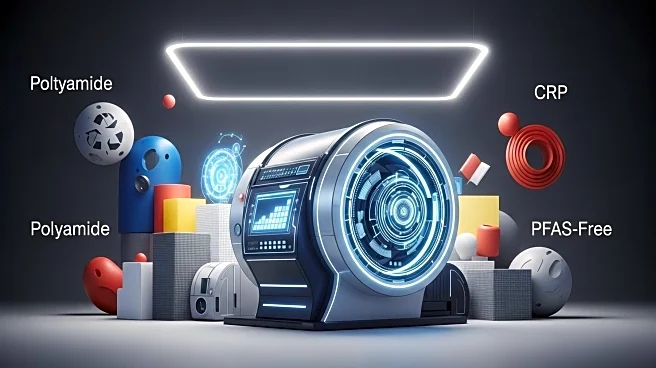What's Happening?
Asahi Kasei, a diversified global manufacturer, is set to unveil its latest innovation in PFAS-free polyamide and continuous carbon fiber recycling technology at the K 2025 trade fair in Düsseldorf, Germany. The company has developed a groundbreaking recycling process that utilizes electrolyzed sulfuric acid to decompose the resin matrix of CFRP pressure vessels while preserving the carbon fibers' original strength and structure. This method allows for the perpetual recycling of high-quality continuous carbon fibers, unlike conventional methods that result in chopped fibers. Additionally, Asahi Kasei will showcase its PFAS-free low-friction LEONA™ polyamide, suitable for various sliding applications, and other material solutions for automotive applications, improved connectivity, and lightweighting.
Why It's Important?
The introduction of PFAS-free materials and advanced recycling technologies by Asahi Kasei addresses growing environmental concerns and regulatory pressures to eliminate PFAS substances. This innovation is significant for industries reliant on high-performance materials, such as automotive and electronics, as it offers sustainable alternatives without compromising quality. The ability to recycle continuous carbon fibers efficiently could reduce waste and production costs, benefiting manufacturers and promoting circular economy practices. Asahi Kasei's advancements in material technology also support the automotive industry's shift towards lightweight and streamlined production, potentially enhancing vehicle efficiency and reducing emissions.
What's Next?
Asahi Kasei's participation in K 2025 will likely attract attention from industry stakeholders seeking sustainable material solutions. The company's innovations may prompt further collaborations and investments in PFAS-free technologies and recycling processes. Automotive manufacturers and other industries may explore integrating these materials into their production lines, potentially leading to broader adoption of environmentally friendly practices. Regulatory bodies might also take interest in these developments, considering them in future policy-making to encourage sustainable manufacturing.
Beyond the Headlines
The shift towards PFAS-free materials and advanced recycling technologies reflects a broader trend in the industry towards sustainability and environmental responsibility. Asahi Kasei's innovations could influence other manufacturers to prioritize eco-friendly practices, potentially leading to a significant reduction in harmful substances in consumer products. This development also highlights the importance of technological advancements in addressing global environmental challenges, showcasing how innovation can drive positive change in industry standards.









